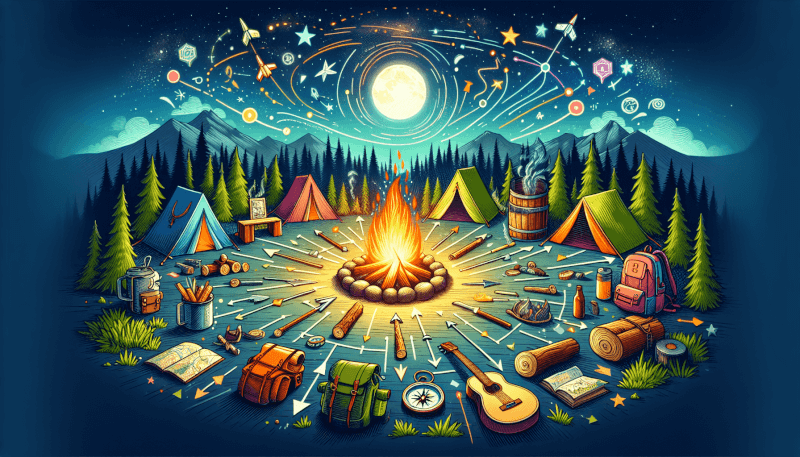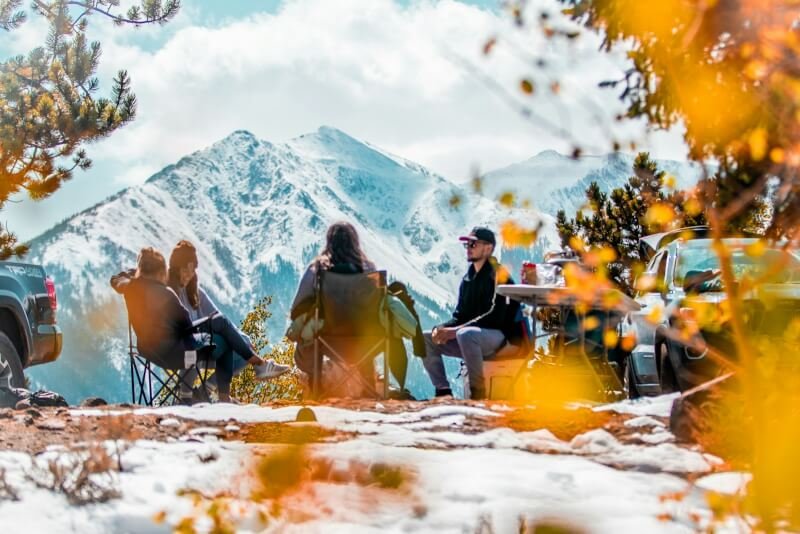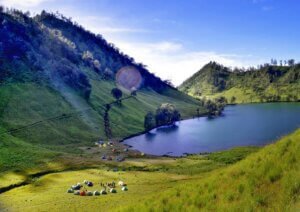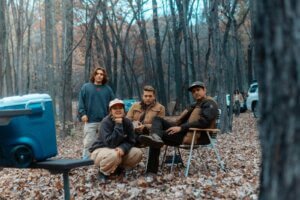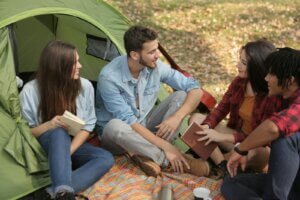Imagine embarking on an unforgettable adventure with a group of friends, surrounded by nature’s pristine beauty. Group camping trips offer the perfect opportunity to disconnect from the hustle and bustle of everyday life, and reconnect with both your loved ones and the great outdoors. With the shared laughter around a campfire, the thrill of exploration, and the joy of pitching a tent under a starlit sky, group camping trips create lasting memories and bonds that endure beyond the days spent in the wilderness. So gather your friends, pack your gear, and get ready for a remarkable experience that will leave you craving for more.
Choosing a Destination
When it comes to planning a group camping trip, choosing the right destination is key. Researching different campgrounds will help you find the perfect spot that suits everyone’s preferences. Take some time to browse through websites, read reviews, and look at pictures to get a sense of what each campground has to offer. Consider factors such as the proximity to amenities, the availability of facilities like showers and bathrooms, and the overall ambiance of the campground. It’s also a good idea to check if the campground allows for group reservations and if there are any specific rules or regulations that might affect your trip. Taking the time to thoroughly research different campgrounds will ensure that you find the perfect destination for your group camping adventure.
Planning Logistics
Once you’ve decided on a destination, it’s time to plan the logistics of your trip. Determining the dates and duration of your camping trip is crucial in order to coordinate everyone’s schedules. Consider any holidays, long weekends, or special events that might affect availability. Once you’ve settled on the dates, it’s important to communicate and finalize the duration of the trip with your group. This will help everyone plan accordingly and ensure that they have the necessary time off from work or other commitments.
Finalizing the group size is another important step in planning logistics. Consider the number of people that can comfortably fit in the chosen destination and the capacity of available accommodations. It’s also important to take into account any restrictions or regulations that the campground may have regarding group sizes. Once you have a clear idea of the group size, you can proceed with assigning responsibilities to ensure that everyone is contributing to the planning process.
Creating a budget is essential to ensure that everyone can comfortably afford the trip. Consider all possible expenses, such as campground fees, transportation costs, food, and any additional activities or rentals. By creating a budget and communicating it with the group, you can ensure that everyone is on the same page and make necessary adjustments if needed. This will help prevent any financial surprises or conflicts during the trip and allow everyone to fully enjoy the experience.
Accommodation Options
When it comes to accommodation options for a group camping trip, there are several things to consider. Tents and sleeping bags are a classic choice, especially if you want to fully immerse yourself in nature. Make sure to bring enough tents to accommodate everyone comfortably and consider the weather conditions to choose appropriate sleeping bags. If you prefer a bit more comfort, renting cabins or RVs can be a great option. Cabins provide shelter and often come equipped with basic amenities, while RVs offer a mobile home experience with added convenience. However, it’s important to check if the campground allows for cabin rentals or RV parking and if there are any additional fees or requirements.
Checking for campground amenities is crucial when choosing an accommodation option. Some campgrounds offer facilities such as showers, bathrooms, electricity, and water hookups, while others may have more basic amenities. Consider what is important to your group and ensure that the chosen campground meets your needs. If amenities like showers are an important factor, make sure to select a campground that offers them. However, if you’re looking for a more rustic experience, you may prefer a campground with minimal facilities. It all depends on the preferences and comfort levels of your group.
Meal Planning
One of the highlights of any camping trip is the food! Creating a menu is an important and fun part of the planning process. Prior to your trip, gather input from the group to find out everyone’s food preferences and dietary restrictions. This will help you create a menu that accommodates everyone’s needs. Consider a mix of easy-to-make meals and more elaborate dishes that can be prepared over the campfire or on a camping stove. Don’t forget to plan for snacks and beverages as well.
Assigning cooking duties is key to ensure that everyone chips in and enjoys the experience. Divide the cooking responsibilities among the group members, considering their cooking skills and preferences. This way, everyone will have a chance to participate and showcase their culinary talents. Make a list of the necessary cooking equipment and ensure that it is properly organized and packed for the trip. This will make meal preparation much smoother and more enjoyable.
In addition to regular meal planning, it’s important to take into account any special dietary needs within the group. Whether someone has food allergies, follows a specific diet, or has other dietary restrictions, make sure to plan accordingly. Consider alternative options, such as vegetarian or gluten-free meals, and ensure that everyone feels included and catered to. Clear communication and collaboration during this stage will help avoid any issues or disappointments regarding food options during the trip.
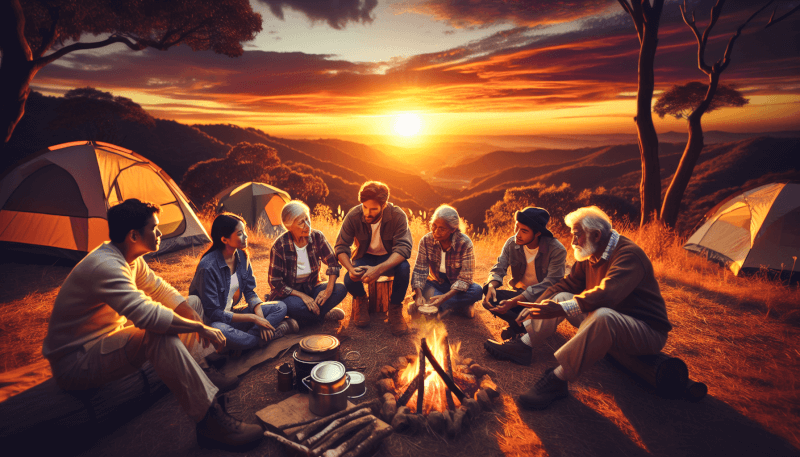
Activities and Entertainment
A group camping trip is an opportunity for everyone to enjoy a variety of activities and entertainment. Hiking and nature walks are popular options that allow you to explore the surrounding natural beauty. Make sure to research the trails and choose routes suitable for your group’s fitness levels. If there are water bodies nearby, swimming and water sports can also provide hours of fun and relaxation. Before engaging in any water activities, make sure to check for safety regulations and ensure that everyone is comfortable and capable of participating.
Fishing and boating are other engaging activities that can be enjoyed during a camping trip, especially if the campground is located near a lake or river. Make sure to check local fishing regulations and obtain any necessary permits. Campfire cooking and s’mores are iconic camping traditions that can bring the group together. Prepare some easy-to-make campfire recipes and don’t forget the marshmallows, graham crackers, and chocolate for the perfect s’mores!
To keep everyone entertained, pack a variety of games and sports equipment. Classic options like cards, board games, and frisbees are always a hit. Additionally, consider bringing along equipment for sports such as volleyball, soccer, or badminton. Nature photography can also be a great way to capture the memories and beauty of the camping trip. Encourage group members to bring their cameras or smartphones and share their favorite shots with the rest of the group.
Safety Considerations
Prioritizing safety during a group camping trip is of utmost importance. Start by checking the weather conditions before and during the trip. Stay updated on any forecasts or warnings to ensure that you are prepared for any changes in weather. Make sure to pack appropriate clothing and gear for the forecasted conditions, including rain gear if necessary.
Having a well-stocked first aid kit and necessary medical supplies is essential. Include items such as band-aids, antiseptic ointment, pain relievers, and any necessary prescription medications. It is also important to have a list of emergency contact information readily available. This should include contact numbers for local emergency services, the campground office (if applicable), and the nearest hospital or medical facility. Share this information with the group and ensure that everyone is aware of emergency procedures and protocols.
Fire safety is crucial when camping. Familiarize yourself with the campground’s fire regulations and ensure that you abide by them. Be mindful of any fire bans or restrictions in the area. Always extinguish campfires completely before leaving the site or going to sleep. Additionally, it’s important to be aware of the local wildlife and any safety precautions that need to be taken. Store food properly to prevent attracting animals and educate the group on wildlife awareness and precautions.
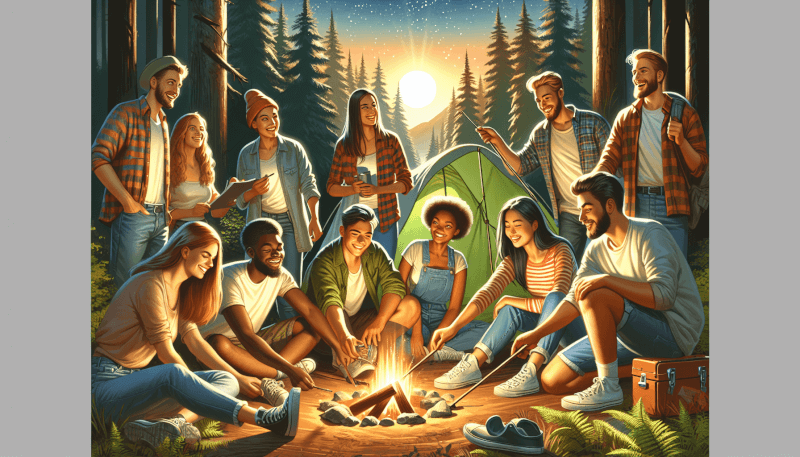
Packing Essentials
When packing for a group camping trip, it’s important to cover all the essentials to ensure a comfortable and enjoyable experience. Appropriate clothing for the weather is a must. Pack layers to accommodate for temperature fluctuations, including extra warm clothing for cool evenings. Don’t forget to pack comfortable shoes for hiking and water activities.
Sleeping gear and camping equipment are also essential. If you’re planning on camping in tents, make sure to bring enough sleeping bags, sleeping pads, and pillows for everyone. If you’re renting cabins or RVs, check if bedding is provided or if you need to bring your own. Additionally, make a checklist of necessary camping equipment such as tents, camping chairs, cooking utensils, flashlights, and camping stoves.
Toiletries and personal items, such as toothbrushes, toothpaste, soap, and towels, should not be forgotten. Sunscreen and insect repellent are vital to protect yourself from harmful UV rays and pesky bugs. Pack enough for everyone in the group and remind everyone to apply these products regularly.
Food and cooking supplies are essential for a successful camping trip. Make a list of all the food items you’ll need, including ingredients for planned meals and any snacks or beverages. Don’t forget to pack coolers or ice packs to keep perishable items fresh. Bring along cooking utensils, pots, pans, and any specialized equipment you might need for your planned meals.
Entertainment and recreation items can enhance the overall camping experience. Pack board games, cards, balls, frisbees, or any other items that your group enjoys. Also, don’t forget any necessary equipment for specific activities such as hiking gear, fishing gear, or sports equipment.
Transportation
Arranging transportation for a group camping trip requires some coordination and planning. If possible, consider carpooling or organizing group transportation to minimize the number of vehicles and reduce the environmental impact. This can also help save on gas expenses. Make sure to coordinate departure times and locations so that everyone arrives at the destination around the same time.
When considering transportation, it’s important to take into account the capacity and storage of the vehicles. Ensure that there is enough room to comfortably fit all the camping gear and luggage. If necessary, consider renting a larger vehicle or a trailer to accommodate the group’s needs. Additionally, it’s important to have accurate and updated directions to the campground. Make sure to review the routes in advance and provide clear directions to all drivers.
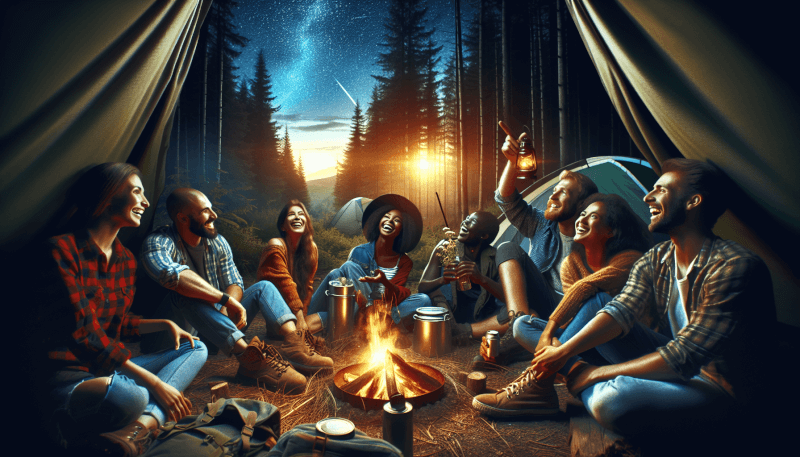
Group Dynamics
To ensure a smooth and enjoyable group camping trip, it’s important to set expectations and ground rules from the start. Communicate openly with the group about everyone’s responsibilities and what is expected of each individual. This includes tasks such as setting up and taking down tents, cooking and cleaning duties, and participating in group activities. By clearly defining everyone’s roles and responsibilities, you can promote a sense of teamwork and cooperation.
Facilitating communication is key to maintaining a positive group dynamic. Make sure that everyone has the necessary contact information for the trip, including phone numbers and emergency contact details. Establish a communication plan so that everyone is aware of how to stay in touch during the trip, especially if cell service is limited. Encourage open and respectful communication, and address any concerns or questions that arise promptly.
Conflicts can occasionally arise in group settings, so it’s important to be prepared to handle them. Establishing a conflict resolution process beforehand can help prevent issues from escalating. Encourage open dialogue, active listening, and respect for differing opinions. If conflicts do arise, address them calmly and find a compromise that works for everyone. promoting teamwork and cooperation among group members can help foster a positive and enjoyable camping experience.
Post-Trip Follow-Up
After the group camping trip is over, it’s important to reflect on the experience and maintain the group’s connection. Share photos and memories with the rest of the group through a shared photo album or online platform. This will allow everyone to relive the highlights and preserve the memories of the trip.
Express gratitude and provide feedback to the group members for their contributions to the trip. Thank each individual for their efforts in planning, cooking, organizing, or any other tasks they undertook. Share your appreciation for their participation and the positive impact they had on the overall experience. Additionally, encourage everyone to share their feedback and suggestions for future improvements. This will help ensure that future group camping trips are even more enjoyable.
Planning for future group camping trips can be an exciting way to keep the adventure going. Discuss potential destinations and activities for upcoming trips, and encourage everyone to share their ideas and preferences. Set a timeline for planning the next trip and establish a plan for how decisions will be made. This will keep the group engaged and excited for future camping adventures.
In conclusion, planning a group camping trip requires careful consideration and coordination. By thoroughly researching different campgrounds, planning logistics, choosing suitable accommodations, and organizing activities, meals, and safety measures, you can create a memorable and enjoyable experience for everyone involved. By maintaining open communication, addressing conflicts, and expressing gratitude, you can foster a positive group dynamic and ensure that future group camping trips are just as successful.
